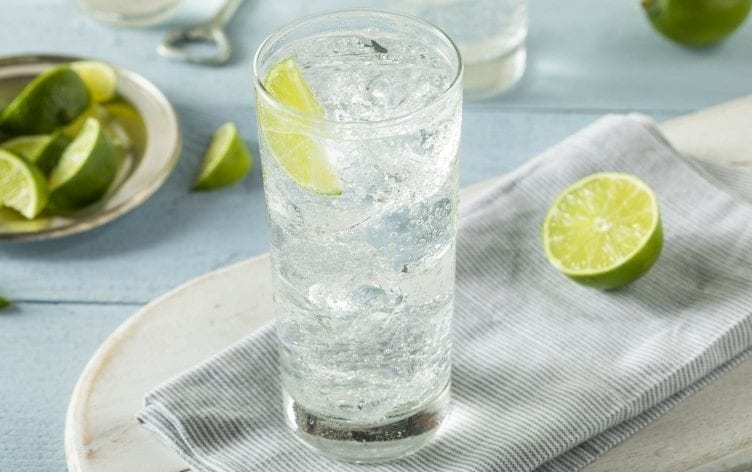
Is Flavored Sparkling Water Killing Your Weight-Loss Goals?
Take a stroll through the bottled water section of any grocery store, and you’ll notice bottles and bottles of different types of water. Sparkling, flavored, mineral, electrolyte — you name it. And it should be no surprise that 0-calorie flavored sparkling water is an extremely popular choice, whether your goal is to lose weight or simply maintain.
“Dieters are looking for ways to cut calories to promote weight loss,” explains Amy Goodson, a registered dietitian and nutrition consultant. “However, many dieters don’t want to give up their favorite taste and flavors, so they look to these artificially sweetened beverages to ‘sweeten’ their day and feel less deprived.” Plus, some people don’t like the taste (or lack thereof) of water, Goodson adds.
But are these beverages actually good for you, especially if you’re trying to lose weight? Are they akin to diet soda, full of artificial sweeteners? Or do they just make you crave other sweet flavors, sabotaging your healthy eating plans?
Here’s what nutrition experts have to say:
NATURAL FLAVORING AND ARTIFICIAL SWEETENERS
Many of these calorie-free beverages utilize “natural flavoring” to add taste. While they’re not artificial sweeteners, it’s not immediately clear what natural flavorings are. Sure, they’re zero calories, but that doesn’t necessarily mean they’re healthy. Some companies use essential oils and fruit extracts, but with the vague label “natural flavoring,” it’s pretty hard to tell what’s actually in them and how they affect us.
Still, beverages that use this type of flavoring are better than conventional soda (or even diet soda). “Some dieters are drinking these beverages in place of soft drinks,” notes Tracy Lockwood Beckerman, registered dietitian and in-house nutrition expert at Betches Media. “By making this swap, soda drinkers are able to get the satisfaction of a refreshing, bubbly drink, without the unnecessary sugar and calories.”
Some versions of calorie-free sparkling water also use artificial sweeteners, which are somewhat controversial. “With artificially sweetened beverages, there are no calories, which can make them a good option for flavor, if you are OK with artificial sweeteners,” says Goodson. The FDA and research supports the idea that they are safe to consume, but many people (including some nutrition pros) are skeptical.
“While I think moderate consumption is OK, the natural sweeteners and no-added sugar could possibly trigger cravings,” Beckerman says. For some people, drinking something sweet, even if it’s sugar-free, can make them crave more sweet flavors ASAP. Still, it ultimately comes down to the individual and what they can handle. As of now, there’s no hard evidence that natural flavorings or artificial sweeteners sabotage your weight-loss plans.
CARBONATION AND WEIGHT GAIN
“One reason why sparkling water is so popular with dieters is because, when compared to plain water, consuming carbonated beverages on an empty stomach is significantly more filling,” Beckerman explains. “This is because the carbonation takes up more space in the stomach, and is said to increase both gastric activity as well as heart rate, which can contribute to feelings of fullness.” Though it’s unlikely to have a major impact on satiety over the course of a day, sparkling water may be enough to prevent unplanned snacking in a pinch, she says.
Those who are against flavored sparkling water often point to research, published in the journal Obesity Research and Clinical Practice, which found carbonation might cause weight gain, as a reason to avoid it at all costs. Experts, however, are unconvinced.
“In the study, those who drank carbonated water had ghrelin (hunger hormone) levels six times higher than those drinking regular water, and three times higher than those drinking non-carbonated sodas,” Beckerman notes. That doesn’t sound great for sparkling water. “However, the study didn’t account for external factors that could have influenced weight gain such as an unhealthy diet or lack of exercise,” she says. “The research did not directly tie sparkling water to weight gain.”
Goodson agrees, noting that there is no solid evidence carbonation alone (or at all) causes weight gain. “It’s important to note that lots of things can stimulate hunger and many people that sleep too little, experience stress and yo-yo diet could fall prey to increased hunger.” In other words, there are a lot of things that can cause an increased appetite, and while flavored sparkling water might be one of them, it’s probably less impactful than lifestyle practices that are shown to have a bigger impact.
THE BOTTOM LINE
In the end, it really comes down to how these beverages fit into your diet. “If a bubbly drink helps you drink more fluid and keep your calories low for weight loss, then I believe it can be a part of a healthy eating plan,” Goodson says. “We always want people to drink water, but the recommendation is actually based on fluid consumption, and these fluids can fit.”
It’s a good idea to check in with yourself about how these drinks make you feel, though. “For some people, consumption of fizzy beverages can make them bloated, distended and gassy,” Beckerman points out. “If you experience these side effects, it is important to listen to your body and cut back consumption of carbonated water.”
Recommended alternatives, she says, are unsweetened tea, black coffee or fruit-infused water. “If you want to get some added electrolytes without the bubbles, go for coconut water or watermelon water, but make sure there isn’t any added sugar in the product,” she adds.
Originally published July 2018
































